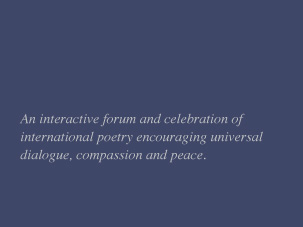| |
 |
 |
 |
Kwame Dawes, born in Ghana in 1962, spent most of his childhood and early adult life in Jamaica.
As a poet, he is profoundly influenced by the rhythms and textures of that lush place, citing in a recent interview his "spiritual, intellectual, and emotional engagement with reggae music." His book Bob Marley: Lyrical Genius remains the most authoritative study of the lyrics of Bob Marley.
His eleventh collection of verse, Wisteria: Poems From the Swamp Country, was published in January 2006. In February, 2007 Akashic Books published his novel, She's Gone and Peepal Tree Books published his twelfth collection of poetry, Impossible Flying, and his non-fiction work, A Far Cry From Plymouth Rock: A Personal Narrative.
His essays have appeared in numerous journals including Bomb Magazine, The London Review of Books, Granta, Essence, World Literature Today and Double Take Magazine.
In October, 2007, his thirteenth book of poems, Gomer's Song appeared on the Black Goat imprint of Akashic Books. Dawes has seen produced some twenty of his plays over the past twenty-five years including, most recently a production of his musical, One Love, at the Lyric Hammersmith in London.
Kwame Dawes is Distinguished Poet in Residence, Louis Frye Scudder Professor of Liberal Arts and Founder and executive Director of the South Carolina Poetry Initiative. He is the director of the University of South Carolina Arts Institute and the programming director of the Calabash International Literary Festival, which takes place in Jamaica in May of each year. Kwame Dawes is a regular blogger for the Poetry Foundation. His blogs can be read at www.poetryfoundation.org.
In 2007, Dawes was funded by the Pulitzer Center to write about the AIDS crisis in Jamaica and the people and caregivers battling the disease. You can experience the poems, writings and photographs that resulted from this project at www.livehopelove.com.
 Read more about Kwame Dawes at Blue Flower Arts. Read more about Kwame Dawes at Blue Flower Arts.
|
 |
 |
English
version
Portmore
Here they turned swamp into marl pits,
stretches of reclaimed firm ground, waiting
always for storms to fill craters, allow
the rising tide to meet sudden lakes—
this is the ruined earth before it was
ever glorious. Everything is flat here,
acacia bushes and dull green almond
trees scattered along the road way,
squat as cowering crowds, as if afraid
to rise above it all, afraid of the slash
of the big machete; and where the city
begins, a line of bars and fish dens,
the stench of rotting fish and cooking
garbage. At dusk, the women line
the streets in red and garish green
and the quick flamboyant scar
of yellow—it is a basic trade; making
ends meet; holding body and soul
together, making dicks hard fast
to make them soft quick—it is work;
no sweetness here, just the calculation
of survival. This is where Kingston
has seeped, spilling out new tribes
that try to grow roots in reluctant
soil—the bloodletting continues
over the plains from the water’s edge
to the scraggly heights of St Jago.
Yu will find no palm trees here,
not a coconut frond in sight, and we
come to the crowded beaches for the fish
and festival not for the water and black
sand in these gray foamy coves where
everything has died, and the fishermen
must push far out towards South America
to find a fresh fish to catch. And Lascelles,
dressed in his green gabardine, the well-
pressed olive shirt buttoned like a bad man
to the last button at the throat, struts
through this wilting city—Lascelles
the an with a voice sweet as Delroy
Wilson with the roots ruggedness
of Dennis Brown and a soul boy’s
pretentiousness, like he could dance
band-legged like Ken Booth—
he can sing this small sharp-headed
man, head up, strolling the side streets
with nothing to show for it, hoping that
now since Labor is in, that the green party
people will let him cut a tune,
capture a stage, burst like a hero
for that last triumph before the disease
in his blood, the disease that shadows
even the sound of his name takes him.
Snap a shot of Lascelles leaning back
against a pink wall, shades over his eyes,
left foot pressed against the wall, hands
tucked deep into his pocket, with a cluster
of lazing women, conserving their energy,
waiting for a regular to come by for a quick
one. And he sings into the night, his head
thrown back, his head swaying,
that voice carrying over the squalor,
making these women look up
for a moment, seeing for the first time
in a long time, the magic of an open sky.
Hear Kwame Dawes read this poem, and watch a corresponding
slideshow.
|
 |
 |
English
version
Making Ends Meet
She sells box juice every day
down by the terminus in Spanish
Town, to make ends meet, get
a little something for school
lunch and bus fare for her
big daughter whose body
is fine like hers, skinny
like breeze could blow her;
tal hair, high bottom, nice
shape. Sometimes it come
in like they are sisters
when they step their way
through the muddy pothole
and marl lanes of Portmore’s
blighted streets, and same way,
the men are always asking
for a double mint slam
with two schoolers; and she
knows how to smile, kiss
her teeth and drag her big
daughter along. The girl
now wearing same short
frock and halter top
her mother wears, and mother
know it’s a matter of time
before she start show belly,
though she warn her daily,
but girl is girl, and this Jamaica
is a rough place with man
who will lay wait you,
sweet talk you, offer you
bus fare and food money
each day, and sometimes
he might buy you a nice
shoes; just a matter of time;
and what her mother
who hustling a two cents
selling box juice and icy mint
down by the terminus
in her fade out denim skirt
and broken down clog shoes
with the fabric mangy
to nothing where her tough
heel must rub every time
she step, can offer to this girl
who start to smell herself,
start to want things?
Fifty dollars for a bag a ice,
the rest is the heat and dust
of the city to make people
thirsty, make them buy.
Ever since she test positive,
nothing won’t go right
for her, it come in like
a curse to blight her day—
big woman like this
depend on her mother
for clothes money
for some dollars to buy
pads and panty, what a life.
Man is like death to her;
man just take and take,
and all them leave is trouble,
man is like the grave to her,
she see them coming and run,
man is like a curse on her,
with sweet mouth and lies.
All she have is her box juice
her fifty-dollar ice,
some icy mint and a smile,
just to make ends meet
day by blessed day.
Hear Kwame Dawes read this poem.
|
 |
 |
English
version
A Vanity
I promise myself simple things;
like to fight to the death for my vanity;
to always chase after the damned wind,
for to live fully immersed in one’s vanities
is to surely live. So I promise
that Rachel Eliza will bring her satchel
of cameras and film, and drive me
to an open field between two mountains
near a cottage with its sky blue walls,
when I have reached perfection, when
I have been sculpted down to one
eighty six pounds, and my hair
has been trimmed to a dark gleam
over my skull, and the veins
in my arms are coiled beautifully
over the last breaths of muscle
before my bones take over. For
two weeks of elegance, I will
gambol and cavort shirtless, and lewd,
offer my flat-bellied profile revealing
at last the ribs I had lost so long,
so long ago—and my navel
will be a tight knot, jutting
slightly after being so long
in the dark well of my stomach—
and in that sweet interim, I will be
as beautiful as I have dreamed to be,
and everyone will adore the shape
of my splendid emaciation—all this
before the joints bore against
my worn out skin, this before I join
the bone-yard of the walking dead.
It is the one promise I have made
to myself, and it must come on me
just when the pouis trees begin to yellow
and blue, and the world is in glorious
riot, and in that moment, everything
will be right with me, I promise.
Hear Kwame Dawes read this poem, as well as the musical rendition.
|
 |
 |
English
version
Cleaning
After a while, you don’t bother
with the brief and the pajamas;
you leave him on the sheet,
make him shit himself, then
shift over to the other side
until I can come, lift up
the body, wipe his bottom
with a soft cotton cloth, bundle
up the sheet with two more
in the corner, straighten
out the plastic over the mattress—
sometimes you have to wipe
it, too, then put a towel
under him until the other
sheet dry, and all the time,
you don’t say a word,
you don’t ask for nothing.
You let your hand brush
against your father’s back
and pray his dignity will last
another day. This is how
a man must care for his father;
quiet, casual, and steady.
Hear Kwame Dawes read this poem.
|
 |
 |
English
version
African Postman
Son, who is dat?
Is de African Postman, Daddy
Burning Spear
For Solomon Ephraim Woolfe
East from Addis Ababa, and then south
deep into the Rift Valley I can hear the horns
trumpeting over the flat roofed acacia trees
and the African women bend low with wood
heavy on their backs, and the cows, goats,
donkeys, mules, sheep, and horses snapped
into obedient herds by sprinting children,
move along the roadside. Life happens here.
I am travelling to the land I have heard about,
Sheshemane the green place, five hundred acres
of Jah’s benevolence, and I know now that
I long to hear the roots man tell me how
despite rumours of his passing, the natty
keeps on riding, keeps on standing in the fields
of praise to hold onto the faith of roots people.
Brother Solomon, you put the name Ephraim
on your head and carry the face of the true
Rasta, the face of an Ashanti warrior, eyes deep
under heavy lids, and your skin tight as leather,
blacker dan black. I have met you before
on the streets of Kingston, there where you trod
to the hiss and slander of the heathen, you
natty dread gathering the people’s broken minds
into your calabash; you carry it all, tell them
return to the roots, the healing shall take place—
you are Burning Spear’s voice in the fields of teff,
you tell me of the prophecy of Marcus,
and I listen to you, through the phlegm,
through the gruff of your voice, and suddenly
when I ask about the passing of the Emperor
you rise up like a staff of correction, your voice
reaching back to the mountains, your warrior
self, your yard man greatness, and you speak
a mystery of those who have ears but won’t hear,
and those who have eyes and won’t see,
and I know that this dread will one day stand
in this soil, and find his feet growing roots
and soon the earth will be darker for the arrival
of Solomon. Let the heathen rage, let the doubters
scuff, let this Ghanaian youth whose eyes
have seen the face of Jesus Christ, let him too
sit and marvel at the faith of the natty.
For this African Postman has forsaken
father and mother, and has come to stand
before His Imperial Majesty only to call him
Father, so that the Father might call him son,
and the world will carry on its weary march,
and the ibises will swoop in the Ethiopian dusk
and the smoke will rise from wood fire,
and the night will come with news that the roots
man, after four hundred years of being told
he is homeless, has come home, yes, Jah,
has come home.
|
 |
 |
|
 |
|





